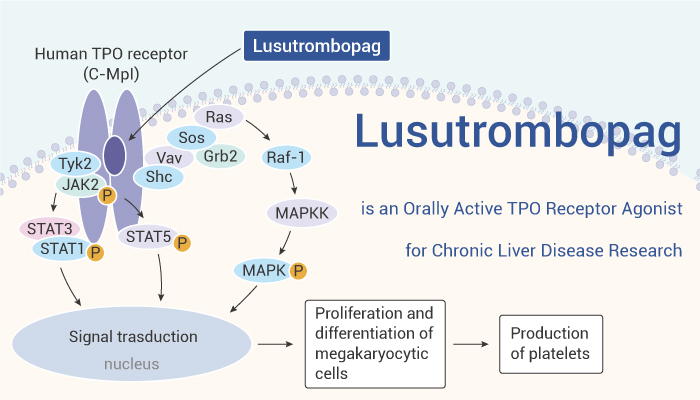The thrombopoietin (TPO) receptor (also known as c-Mpl or CD110) is a hormone that regulates megakaryocyte and platelet production. TPO receptor is synthesized primarily in the liver. Decreased production or activity of TPO can lead to thrombocytopenia (ITP). For example, TPO-R-deficient mice develop severe thrombocytopenia. Chronic liver disease (CLD) is a major public health problem worldwide. And the majority (approximately 76% of CLD patients) are thought to have some degree of thrombocytopenia. Traditional platelet transfusion methods have shortcomings such as safety risks, donor shortage and high cost. The use of thrombopoietin receptor agonists (TPO-RA) can promote platelet production by directly stimulating the TPO receptor on hematopoietic stem cells. Here we introduce a TPO receptor agonist, Lusutrombopag. It has been approved by the United States Food and Drug Administration (US FDA) and the European Medicines Agency (EMA).
Lusutrombopag is an orally effective thrombopoietin (TPO) receptor agonist that increases platelet levels.
Lusutrombopag selectively acts on the human TPO receptor and activates signal transduction pathways. It promotes myeloid cell proliferation and differentiation into megakaryocytes, thereby increasing platelet levels. Lusutrombopag demonstrated efficacy and safety in a model of immune thrombocytopenic purpura. Research in a transgenic mouse model harboring the human form of the mouse TPO receptor. However, repeated oral administration of Lusutrombopag (10 mg/kg; 21 d) increases the macrophage numbers and platelet counts increased significantly. Moreover, Lusutrombopag is also a substrate for breast cancer drug resistance proteins (such as CYP4A11) and P-glycoprotein, but has no significant effect on the activity of CYP3A.
Above all, TPO-RA may also have applications following hematopoietic stem cell transplantation, myelodysplastic syndromes, and chemotherapy-induced thrombocytopenia. TPO-RAs can significantly mitigate the risk of thrombocytopenia, but care must be taken to avoid potential side effects such as fever and blood clots.
In summary, Lusutrombopag is a potent TPO receptor agonist that increases platelet production. It can be used in chronic liver disease research.
References:
[1] Gilreath J, et al. Drugs. 2021 Jul;81(11):1285-1305.
[2] Shirley M, et al. Drugs. 2019 Oct;79(15):1689-1695.
[3] Ding Z, et al. Hepatol Int. 2023 Feb;17(1):180-189.
